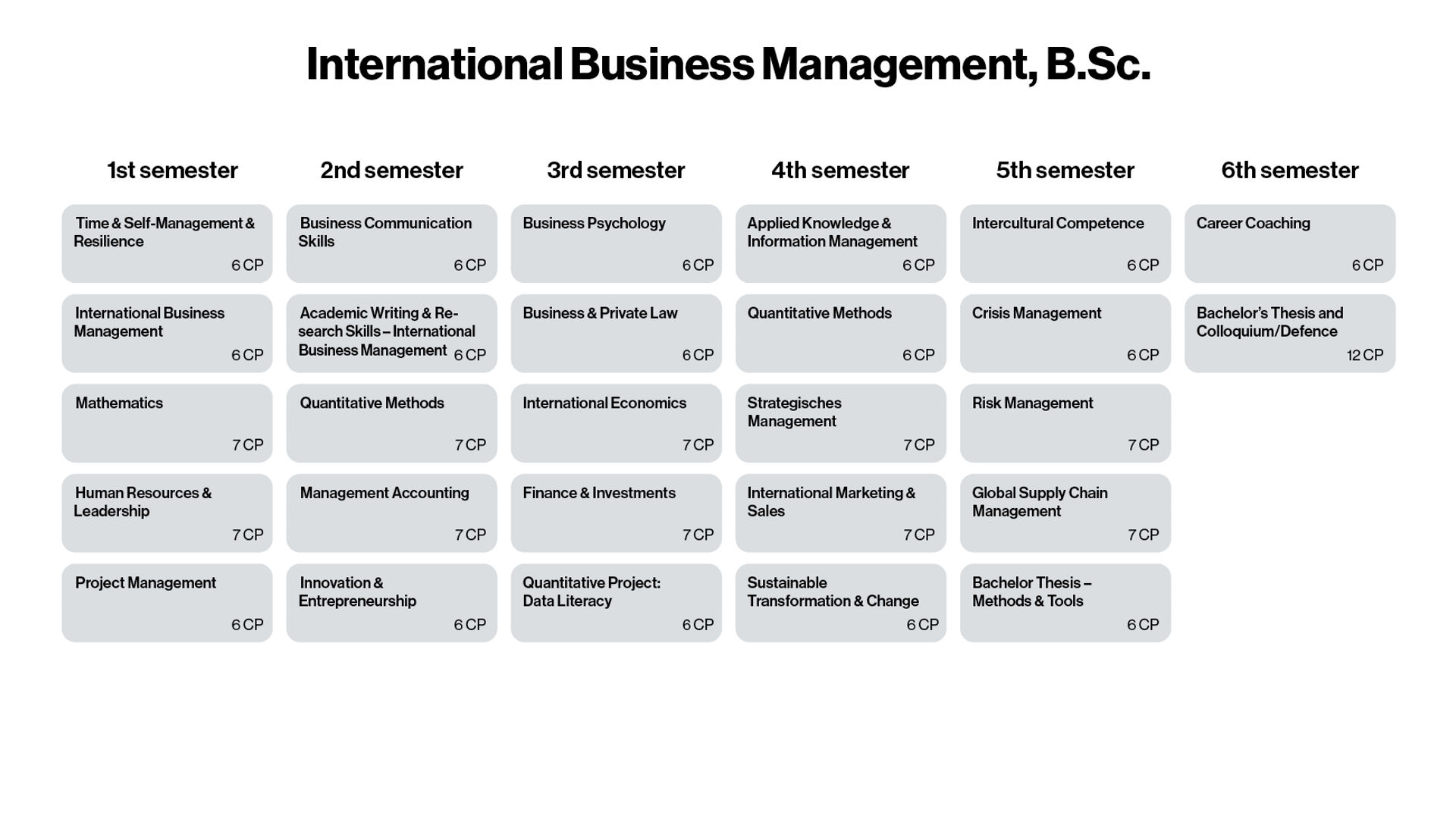Location
Essen
Duration
6 semester including thesis
Credit Points
180 ECTS
Total fee
€ 27,500 (including examination fee and immatriculation fee)
Unfortunately no results for your search
Oh no, somethings seems to have the broke the search results. Please try rephrasing your search term!
Bachelor of Science (B.Sc.)

Semester Overview
Time & Self-Management & Resilience (6 CP)
Basic principles of time management
Methods for self-optimisation (e.g. Pareto principle, ABC analysis)
Resilience and stress management
Study and workplace methods
International Business Management (6 CP)
Basics of business administration
Entrepreneurship and Economics in a global context
Product/business lifecycle
Mathematics (7 CP)
Fundamentals of mathematics
Linear algebra
Differential calculus, integral calculus and welfare analysis
Human Resources & Leadership (7 CP)
Human resource management
Organisational and change management
Sustainable leadership
Project Management (6 CP)
Project management process
AI in project management
Agile project management
Business Communication Skills (6 CP)
Basic business communications
Written communications
Conducting negotiations
Presentation skills
Academic Writing & Research Skills – International Business Management (6 CP)
Importance of academic work in higher education
Basic formal requirements
Scientific strucuture
Selection of appropriate research methods
Quantitative Methods (7 CP)
Initroduction to R
Methods and interpretations
Probability
Hypothesis testing
Management Accounting (7 CP)
Bookkeeping
Balance sheets
Bilance sheet analysis
Cost accounting
Innovation & Entrepreneurship (6 CP)
Entrepreneurship & company formation
Future technologies (e.g. AI) and their impact on markets and business models
Developing a business idea
Business Psychology (6 CP)
Psychological models on the fundamentals of individual and group behaviour
Psychological background on job satisfaction and motivation
Psychological correlations regarding the impact of marketing and purchasing decisions
Business & Private Law (6 CP)
German Civil Code (BGB), General Part
Law of obligations
Commercial law
International Economics (7 CP)
Welfare concepts
Governmental interventions
International economics
Finance & Investments (7 CP)
Stakeholder versus shareholder management
Dimensions and objectives of financial management
External and internal financing planning
Digital and green finance
Quantitative Project: Data Literacy (6 CP)
PPDAC cycle
Data analysis project
Modelling
Statistical software
Applied Knowledge & Information Management (6 CP)
Fundamentals of knowledge and information management
Searching and handling data, information, and knowledge
Application of AI-based technologies with prompt engineering
Quantitative Methods (6 CP)
Fundamentals, Opportunities, and Limitations of Qualitative Research
Planning, Implementation, and Evaluation of One’s Own Research Projects
Use of Artificial Intelligence in Qualitative Research Projects
Strategisches Management (7 CP)
Concepts and tools of strategic management
Industry analysis and developmentof business strategy
International and global market entry strategies Decision theory models
International Marketing & Sales (7 CP)
Specifics of international marketing
International market analysis
International marketing and sales strategies and organisational structures
Marketing mix for global markets
Sustainable Transformation & Change (6 CP)
UN’s Sustainable Development Goals (SDG)
Impact of climate change on businesses and societies
Socio-economic aspects of sustainability
Corporate social
Intercultural Competence (6 CP)
Intercultural management in a globalised world
The power of culture and different cultural dimensions
Corporate cultures and management styles
Crisis Management (6 CP)
Approaches to crisis detection, assessment and management
Core elements, concepts, and measures of turnaround management
Analysis and interpretation of current cases from the international business context
Risk Management (7 CP)
Risk categories for banks and companies
Risk management cycle
Diversification and flexibility
Optimal decisions unter uncertainty
Global Supply Chain Management (7 CP)
Goals, tasks and frameworks of global supply chain management
Efficient consumer response
Planning process
Procurement, production and distribution as part of supply chain management
Bachelor Thesis – Methods & Tools (6 CP)
Formal, substantive, and methodological requirements for academic work
Approaches to topic selection
Academic arguments
Career Coaching (6 CP)
Refining one’s personal competency profile
Professional prospects and identity
Career counselling and job application strategies
Use of innovative AI tools in the application process
Bachelor’s Thesis and Colloquium/Defence (14 CP)
Subject to change.


Full-time on campus
In our Bachelors degree programme “International Business Management” you will be expanding your academic knowledge, gaining specialist subject and methodological understanding and further broadening your decision-making and leadership skills. You study full-time on the campus in Essen and you also have the opportunity to establish initial contacts with companies. During this time, you will have experienced, highly qualified professors and lecturers who will also provide you with individual support.
TestAS
or FOM entrance examination (online examination or within 8 week preparation course)
3 Steps to FOM University
Register your personal data and educational background in the application form.
Please always enter your full name as it is mentioned in your passport. If you do not have a last name, please enter "-".
For the registration, you need the following documents:
All documents have to be translated in German or English. If your original document is written in another language, your documents have to be translated by a certified translator. Please then send a certified copy of the original and the certified translation while applying.
Please send all documents as PDFs and name the file as follows: Last name, first name_Study programme (e.g. Smith, Jane_Big Data and Business Analytics).
Note: Where can I get my documents certified?
the authorities and notaries who are authorised to carry out official certification in your home country.
Please send the filled out and signed application form as well as the mentioned documents in step 2 via email to incomings@fom.de
Please download the application form below.
All information about the degree programme can be found here in a compact PDF document.
Internationally acknowledged degrees
Cooperations with over 10,000 companies
30 years of experience in academic teaching
International network with universities worldwide
Strong research competence
State-acknowledged and system-accredited
1,500 professors and lectures
45,000 students from 118 nations
More than 100,000 graduates
A degree from FOM is not just a qualification – it's your stepping stone to a successful career in Germany and beyond.

President of FOM University of Applied Sciences